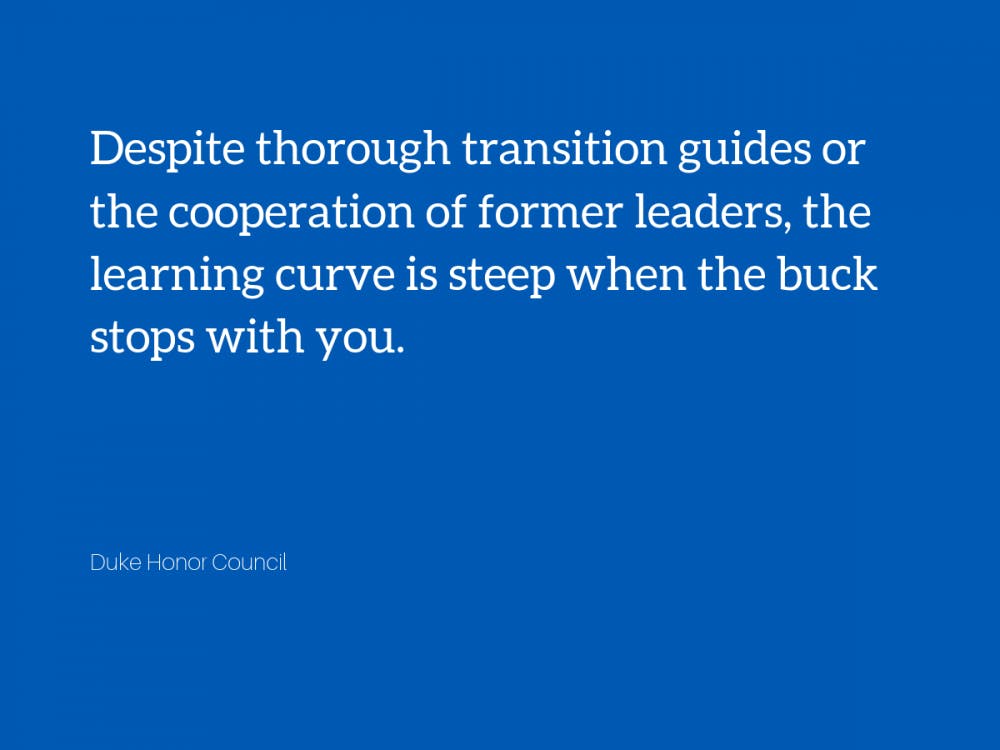We are now a few weeks into the new academic year, which means many of us are inevitably transitioning into our latest campus leadership roles. I remember being surprised when I got to Duke that so many of these positions were held by sophomores or juniors. In high school, at least in my experience, seniors essentially had a monopoly on most of those positions. But in college, when the tenure of a position formally ends, the student holding it oftentimes won’t yet be graduating. On the contrary, they may have one or two years left at Duke, which poses a question: should those students continue to serve in their positions or pass them on to others?
There are a lot of reasons that people seek out leadership positions: passion for an issue, commitment to an organization, the occasional resume-builder. Despite thorough transition guides or the cooperation of former leaders, the learning curve is steep when the buck stops with you. A second year in a leadership position would inevitably improve efficiency, as lessons learned can be translated into adjusted organizational efforts by the person or group of people with firsthand experience. However, that improved efficiency is not always worth the sacrifices that accompany identical leadership within an organization.
The ability to let go of a leadership position is not simply an important character trait to hone on a personal level, but it is also vital for the sustained strength of an organization. There are logistical justifications for this: who wants to be the person to replace someone who has held a position for 2+ years? Will the replacement have the skills and knowledge necessary after being so limited in their exposure to varying leadership styles?
But there are ethical justifications for this continued transition of power as well. Opening up positions allows the organization to be strengthened by new perspectives. The transition teaches the organization not only how to continue after the loss of paramount leaders, but how to become strengthened by new perspectives. When one person is consistently calling the shots, important voices are excluded and those who have not had access to similar roles in the past may never have that opportunity. Additionally, it is critical that we are forced to understand our successes and failures in a way that allows us to communicate our experiences and advice to our successors. In doing this effectively, they too will have the skills to absorb lessons learned and tangibly change the student group for the better.
This is not necessarily a one-size-fits-all approach. All organizations function differently and new student groups in particular may be in need of more consistent leadership for the first few years. However, no matter the individual circumstances of an organization, leaders and members should take the time to consistently challenge power structures and the best ways to maintain their organizational strength and influence. Strength is stability. When the founders or long-time leaders have graduated, can the organization sustain itself? Have fresh minds and voices been provided with the tools necessary to continue its growth?
We only have four years here—a lesson that we all end up learning far too quickly. Duke is composed of thousands of students; we all have strengths, weaknesses, biases, and niche expertise. When we forego additional years in a position, we ensure that the breadth of diversity present on Duke’s campus is sustained within our organizations and throughout campus leadership roles. I know that I personally have benefited, both directly and indirectly, from the students before me who passed on a role, trusting that the position and corresponding organization were safe in my hands.
Enjoy this year of contributing fiercely to your respective communities and making our campus better. And then teach others how to do the same, knowing that your advocacy need not end with the formal title that you hold so dear.
This column was written by Amelia Steinbach, a Trinity junior. She is the Chair of Duke University Honor Council. Their column, integrity over image, runs on alternate Tuesdays.
Get The Chronicle straight to your inbox
Signup for our weekly newsletter. Cancel at any time.

